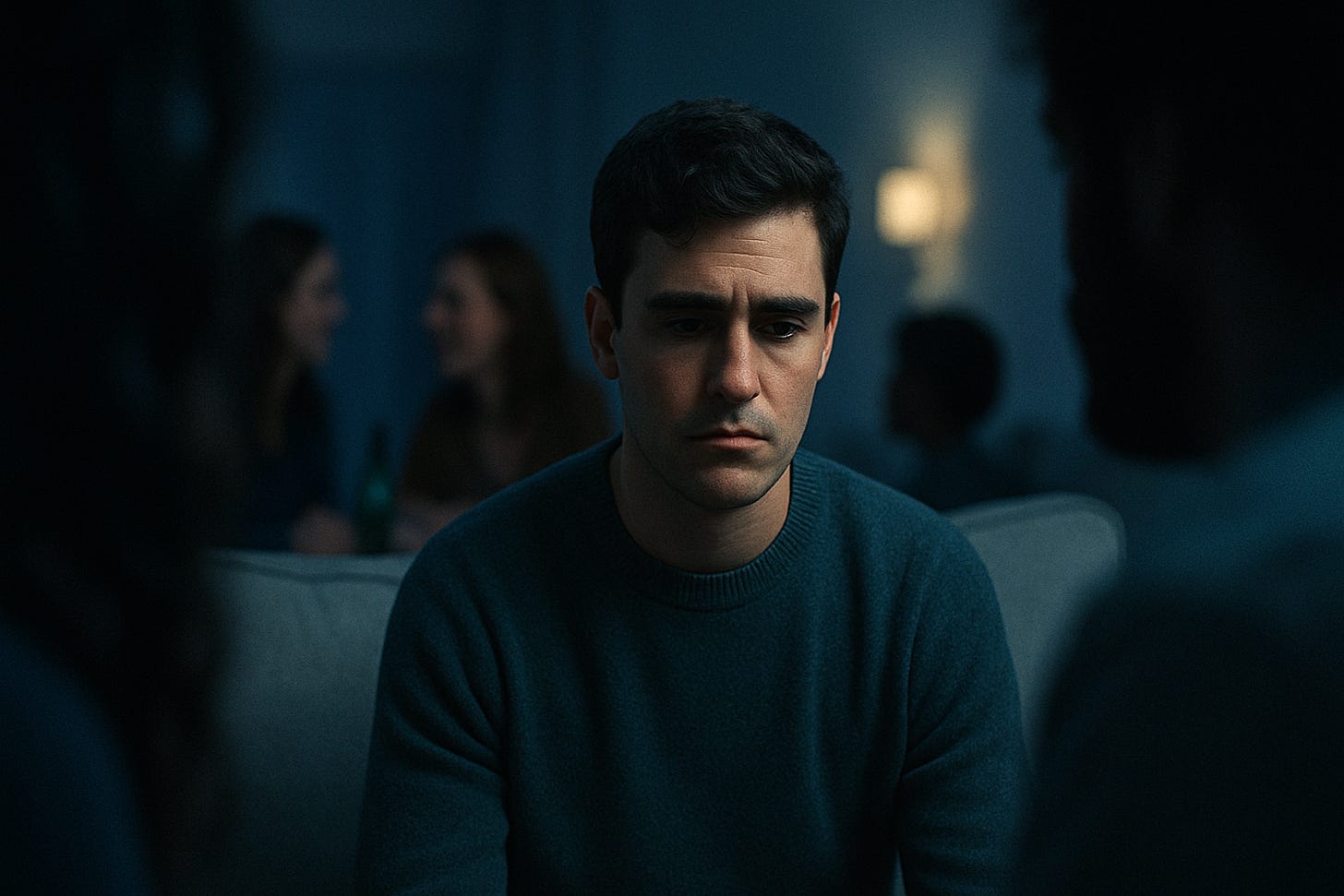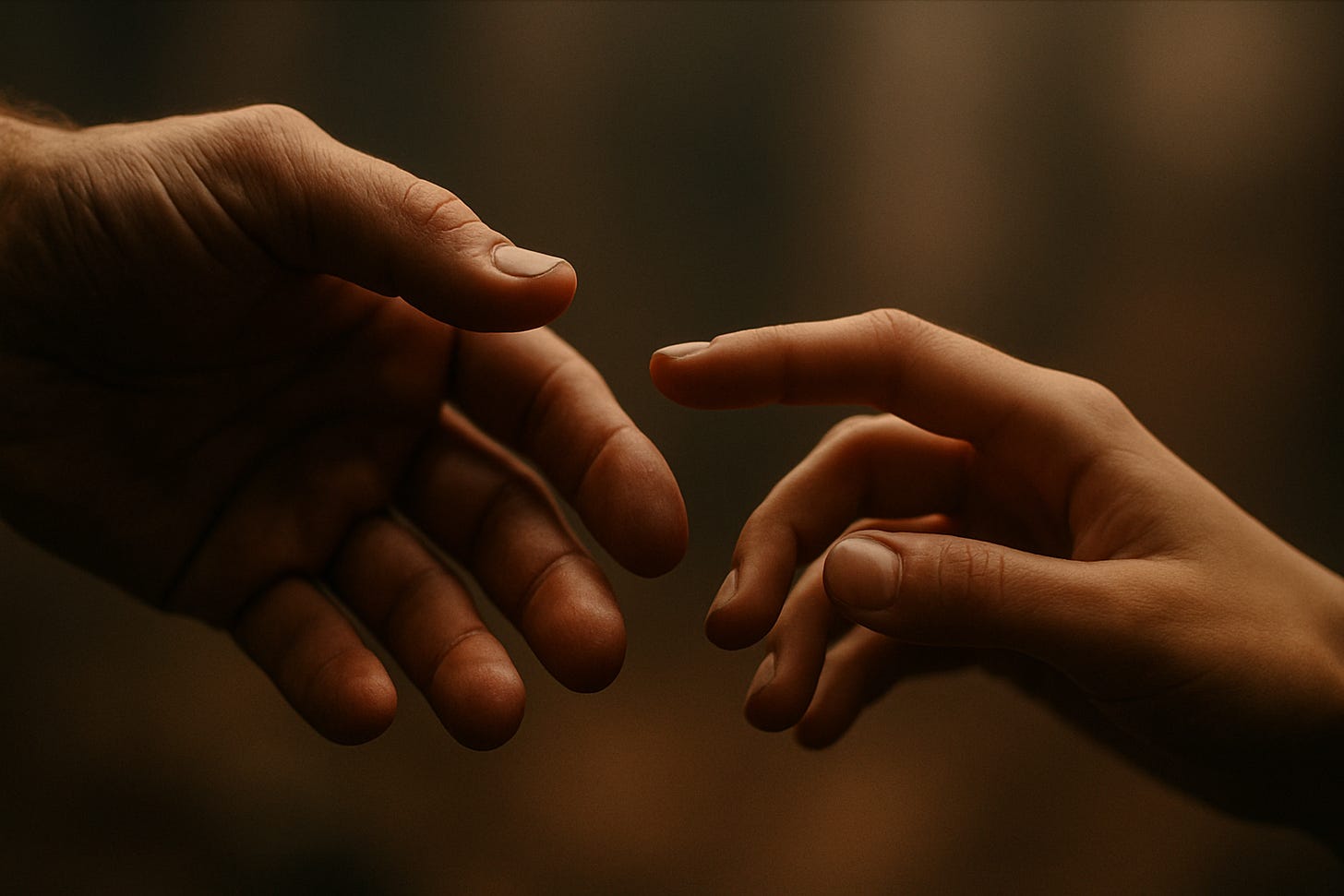How to Help Someone Who’s Struggling (Even if You Don't Know What to Say.)
You don’t need a psychology degree or magical advice to show up for someone who’s hurting. You just need your presence, your patience, and a little courage to open a door.
You don’t need a psychology degree or magical advice to show up for someone who’s hurting. You just need your presence, your patience, and a little courage to open a door. The right words don’t matter as much as being there.
Win The Night is reader-supported. Become a subscriber, and get all our posts for free! Plus, upgrade for exclusives & podcast credit. Click here!
Start by paying attention when something feels off.
We all have that inner nudge when someone close to us seems different. Maybe their messages are slower to arrive or their laughter feels a little thinner.
Sometimes it’s something so small, you almost talk yourself out of noticing it,like maybe you’re reading too much into things, or it isn’t your place to ask.
But that flicker of awareness matters.
It’s easy to ignore, to let time pass and hope they’ll bring it up if something’s really wrong. But most of us won’t. We keep the heavy stuff tucked away until someone asks, gently and kindly, if we’re okay.
Opening that door doesn’t have to be a grand gesture.
It can be as simple as saying,
“I’ve noticed you seem a little quieter lately. How are you, really?”
Peep that second question:
“How are you, really?”
This isn’t a demand. It’s an invitation, a soft landing where they can choose to share or not. And sometimes that’s all someone needs to begin opening up.
Even if they brush it off with a quick “I’m fine,” they’ll know you noticed. They’ll remember that someone cared enough to ask.
That seed of care lingers longer than you might expect. And sometimes, the next time you ask, the answer might be different.
Checking in doesn’t have to happen only when things feel heavy.
Making a habit of asking deeper questions—What’s been on your mind lately? What’s felt hard?—builds trust. It creates a space where being honest feels safe, not forced.
Lead with listening, not fixing.

It’s a deeply human thing to want to make it better.
The moment someone starts to share their struggles, our instinct kicks in—offer advice, suggest solutions, lighten the mood. We want to pull them out of the hole they’re in.
But more often than not, what someone needs isn’t a rope, it’s a witness.
Someone to sit beside them and say, “I see you. I hear how hard this is.” Not to erase the pain, but to honor it.
Listening well means slowing down. Letting there be pauses. Letting there be silence.
Those quiet moments aren’t awkward; they’re sacred. They give people room to find their words, or maybe just sit with their feelings without having to explain them.
If you aren’t sure how to respond, honesty is always a safe place to land.
You can say, “I don’t have the right words, but I’m here with you.” Or, “I can’t imagine exactly how this feels, but I’m so glad you told me.”
Listening doesn’t mean never speaking. But it means responding in a way that says, I’m here with you in this, not trying to move past it too fast.
Listening is an act of love. You don’t have to solve someone's pain to make a difference, just being there is enough.
When we offer that kind of presence, we give people the gift of feeling seen without judgment or urgency. That, in itself, can be healing.
Know your role when offering help.
After someone opens up, it’s natural to feel the urge to do something.
To ease their pain, to guide them toward the light, to be their anchor. But your role isn’t to steer the ship. It’s to walk beside them, matching their pace, asking gently what they need.
Sometimes they won’t know what they need. That uncertainty can feel uncomfortable, but it’s okay to stay there together.
You might offer, “Would it help to talk more about this another time?” or “Do you want to look for support together?” These are gentle invitations, not directives.
If they’re open to help, your presence can be a steadying hand without taking over.
You could offer to sit with them while they research therapists or support groups, or be there while they make that first call.
The point is not to fix it all, but to be a companion through the hard steps.
Maybe you offer to help write a message to a counselor.
Or you sit quietly beside them as they navigate websites and options.
These small actions might seem minor, but they make the process less lonely and overwhelming.
Sometimes just having someone there changes everything.
When you’re struggling too, it’s okay to share your limits.
Here’s the truth that doesn’t get talked about enough: sometimes you’re not okay either.
You’re carrying your own weight while trying to hold space for someone else, and it feels messy because it is messy.
But showing up for someone else doesn’t mean draining yourself dry.
It’s okay to admit when you’re stretched thin. In fact, that honesty builds a stronger connection.
Saying something like, “I care about you so much, and I want to be here for you. I’m also feeling pretty stretched right now, but maybe we can find someone together who can help more deeply,” honors both of your needs.
There’s no shame in needing help while helping. If it feels like you’re both struggling, that might be the moment to lean into support together. Reaching out to a professional, calling a helpline, or even just naming that things are hard right now—those are acts of courage.
There’s power in not going it alone.
And here’s something else: naming your own limits doesn’t make you less supportive. It makes the relationship real. It says, I care about you, and I care about me, too.
Keep showing up, even in small ways.

The most powerful support isn’t a one-time conversation.
It’s in the ongoing showing up. The text the next day: I’m thinking of you.
The check-in a week later: How have things felt lately? Those steady reminders that they’re not alone.
Sometimes those little moments are what carry people through—the reminder that someone sees them, even when they feel invisible. Support isn’t about grand gestures. It’s in the consistency. The quiet commitment to keep showing up.
And in that, there’s a kind of healing that words alone can’t offer.
You don’t have to carry someone else’s burden. But you can walk beside them for a while.
And that walking together?
That’s where the real healing happens.
It’s where connection deepens, and where we remind each other that we are never truly alone in this messy, beautiful human experience.
How will you show up for your friends this week? Let me know in the comments.







This is well stated support. Thank you. I’ve been in that place of space-holding a lot in my life. These days I’m attempting to do the harder thing of showing up and being present for myself. It’s always been easier for me to guide others than to follow my own advice.
I really appreciate your posting. Your message of walking with instead of guiding is so spot on. Thank you!